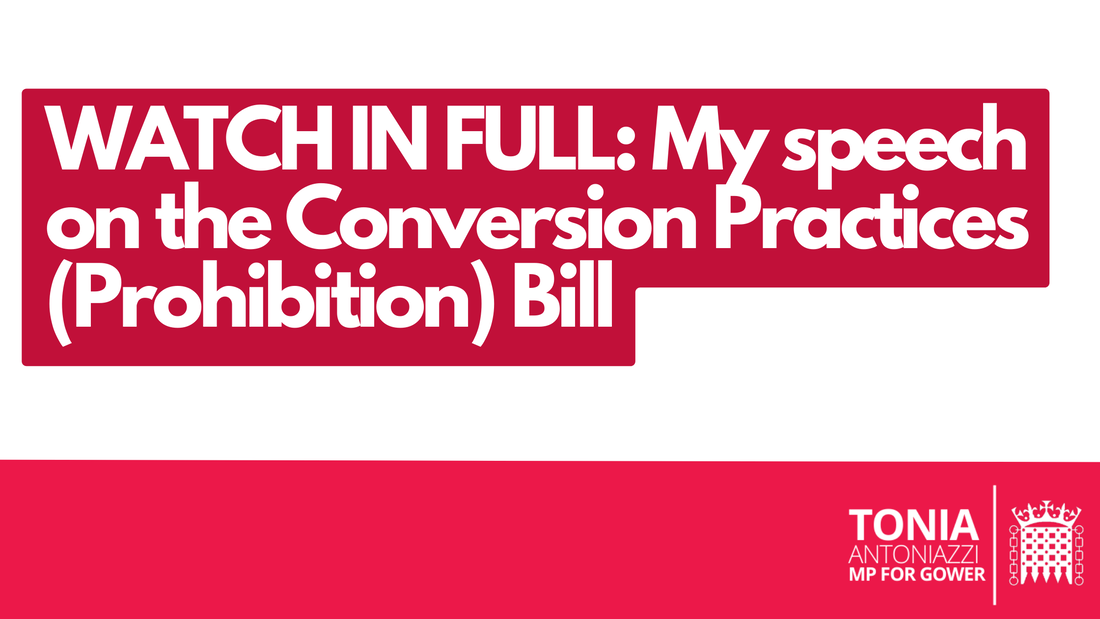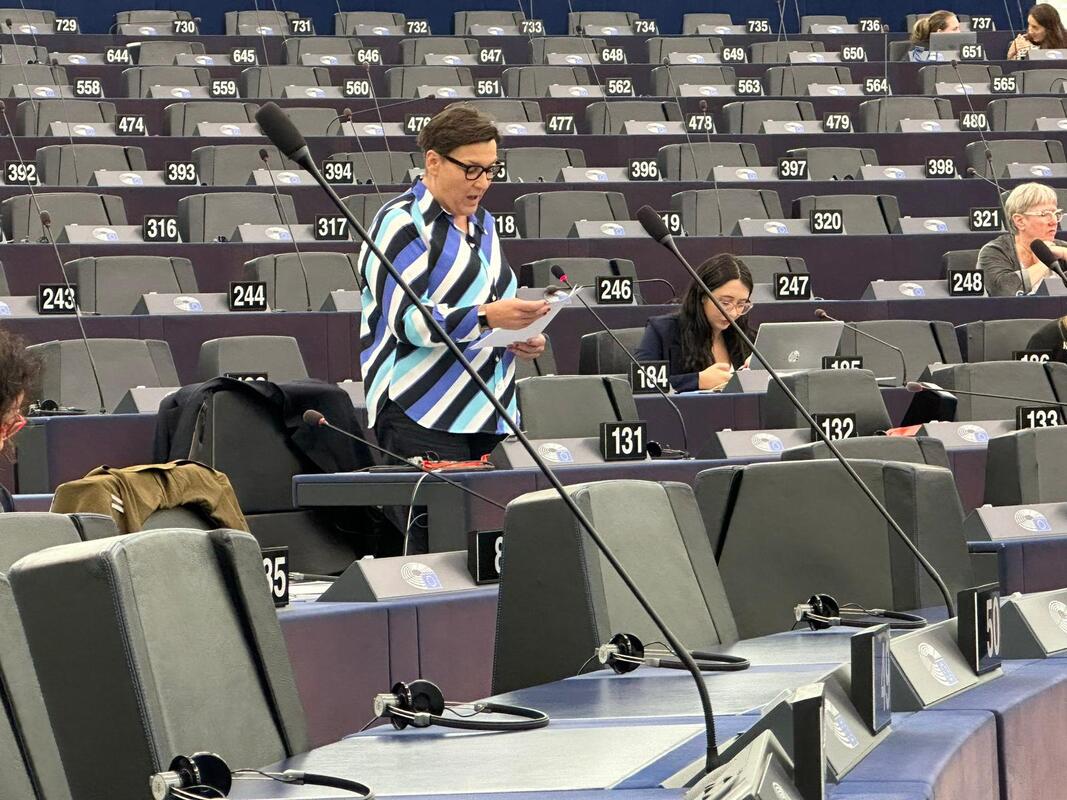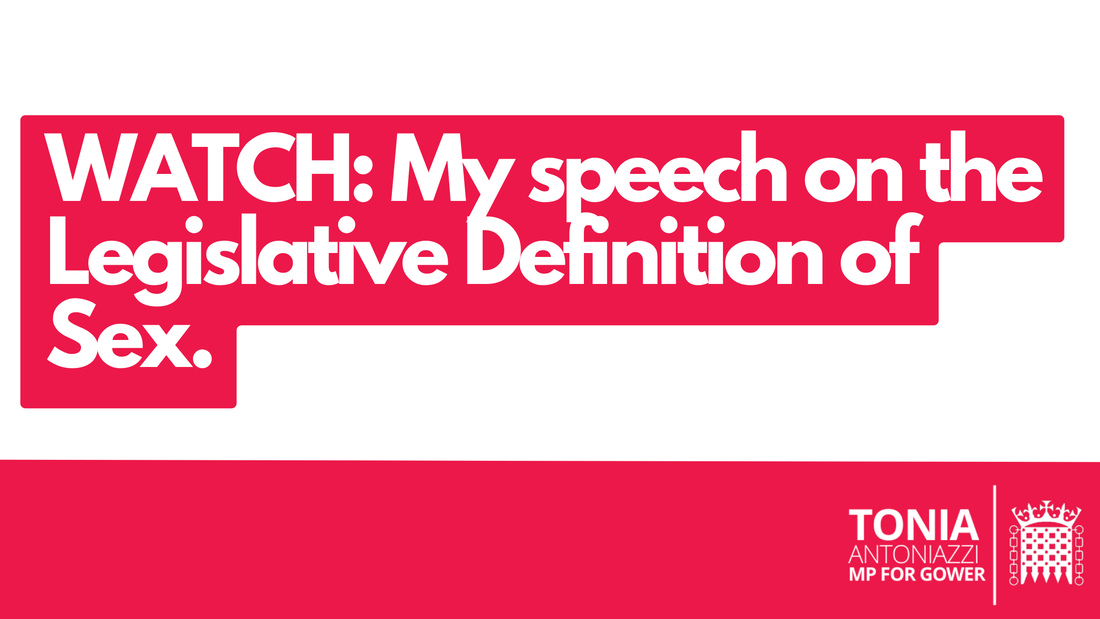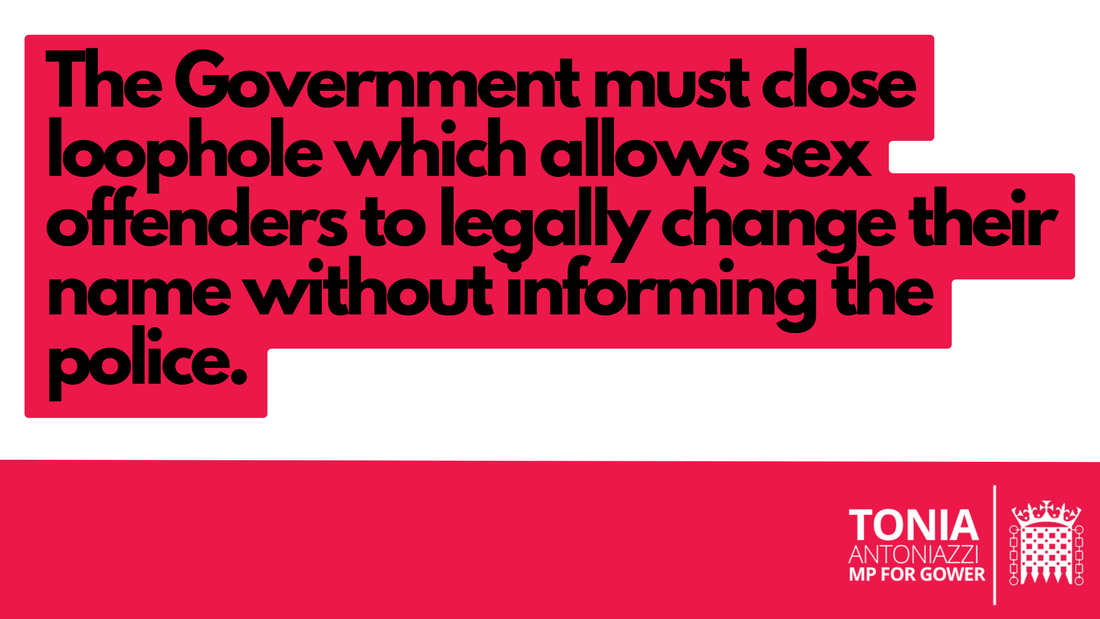WATCH IN FULL: My Adjournment debate speech on the commercial sexual exploitation of women.24/7/2024 On Tuesday 23rd July I led an adjournment debate relating to Commercial Sexual Exploitation.
You can read the transcript and watch my speech in full.
0 Comments
On the 1st March I spoke in the debate on the Conversion Practices (Prohibition) Bill.
You can read the transcript and watch my full contribution below. On Monday 12th June I opened a Westminster Hall debate relating to the definition of "sex" in the Equality Act 2010. You can read the transcript and watch my full contribution below. I beg to move,
That this House has considered e-petitions 623243 and 627984, relating to the definition of sex in the Equality Act 2010. It is an honour to serve under your chairship, Mrs Cummins. I am pleased to open the debate on the petitions on behalf of the Petitions Committee. One petition calls on the Government to update the Equality Act 2010 to make the characteristic of sex refer to biological sex, and the other petition calls on the Government to commit to not amending the Act’s definition of sex. Opinions about the relationship between biological sex, gender identity and the law divide organisations, political parties, and even family and friends. Many people have told me that this is something that they are afraid to speak of, and some say it should not be discussed at all. Others have told me of how they are relieved and happy that we are finally discussing it in Parliament. INTERVENTION FROM LAYLA MORAN MP I am grateful to the hon. Member for giving way so early on. On her point about people being scared to talk about the subject, is she also aware of people like my constituents, who have written to me to say that they are scared that it is going to be talked about? Whenever such things are spoken about in Parliament, there is then a rise in hatred and violence. I thank you, Mrs Cummins, for your words about being courteous, but does the hon. Member understand the worry there is in some communities that the debate is happening, and would she urge other Members to stay compassionate and open minded? TONIA ANTONIAZZI MP RESUMES When the hon. Member listens to my speech, I think she will understand the compassion with which I speak. She will also understand that we are in a difficult position: we are legislators, and where there is something that needs to be addressed, as there is in these two petitions, it is down to us to stand up and make that change and have the conversation. It goes with the job, I am afraid. Members from all parts of the House can model the respectful, adult conversations that are needed across society. We can demonstrate, here at Westminster, that we can freely express and listen to different opinions. This is a set of issues on which views are held profoundly and with good intentions. The nature of this debate means that those views differ across the House, and even within our own respective parties. I was in education for 20 years before coming to this place. My priority has always been the wellbeing of those in my care, be they adults or children. I am afraid that asking probing and difficult questions to get through issues and problems is in my nature. I will not be cowed when looking out for my constituents, be they lesbian, gay, bisexual or trans. The conversations that I get the most out of are the ones where I explore, learn and am able to disagree agreeably. It is a mark of adult politics not to pretend that we are in perfect agreement on every issue, and Westminster Hall debates like this offer the opportunity for us to explore issues, free from the usual pressures of votes and the instructions of the Whips. This is a debate that will explore the difficult interrelationships that exist between rights, and it will mark the difficult lines between which individuals’ and collective rights are drawn. However, it is for the House to decide the way those rights are formed and how they are interpreted. We are holding this debate on behalf of individual people facing discrimination, and in support of service providers and public servants who have a deep commitment to reducing discrimination and to providing safe and welcoming environments. Our task is to make decisions on the boundary of rights and to take responsibility, rather than passing it on. We may draw different conclusions from historic debates on the legislation, but our responsibility is to make our decisions on what would be the right law to have now. In order to prepare for the debate, the Committee Clerks arranged for me to meet the petitioners and organisations supporting these two petitions. I thank them all for their time and input. The House of Commons Library has also produced a debate pack that covers the complexity of the legal issues behind the two petitions. I am most grateful to everyone who has spoken to me, because there are two broad positions. Those who support the petition to update the Equality Act say that the law should be clear about the two sexes, and that it was never the intention of the Act to make it difficult or impossible to have sports that are for biological females only; to protect services that are for women, such as domestic violence refuges; to assure an elderly woman or a woman getting a smear test that, when she asks for a female carer or nurse, she has the right to be treated by a biological woman; to provide single-sex spaces where women are undressing and washing; for same-sex-attracted people to have opportunities to associate with each other; and for the public sector equality duty to consider the needs of women separately from those of trans women. Kate Barker from the LGB Alliance and Julie Bindel and Tamara Burrows from the Lesbian Project, who support the clarification of the Equality Act, explained to me that the protected characteristic of sexual orientation is contingent on the definition of sex as biological, and that the Act did not intend to remove the rights of association for same-sex-attracted lesbians. I heard how, for the lesbians I met, biological sex is fundamental to understanding their rights as same-sex-attracted people, so the grey area that we have is creating ongoing problems for lesbians. If we do not say that “sex” in the Equality Act means biological sex, we may as well scrap the protection of sexual orientation. They said that the protected characteristic of gender reassignment exists. Trans people are able to hold their own separate groups under the protected characteristic and can also associate with lesbian groups already open to them; so the question posed was: why cannot lesbians organise lesbian-only spaces? The Lesbian Project is an organisation that wants to research and study lesbian lives and survey lesbians. If trans women are included, it renders the research meaningless and pointless. This is not, I was told, about being anti-trans; it was about the bedrock of being a lesbian, and a lesbian is a female attracted to females. It was highlighted that there must be protections for trans people, but not at the expense of women’s rights. It is becoming a barrier to lesbians in coming out, which is a huge problem for them. The question for many is: should women be allowed female-only associations? Should it be easy and straightforward for women to be able to undress, shower and use a toilet in female-only spaces? Those who want the Equality Act to stay as it is say that trans people are already using services for the opposite sex without concerns, regardless of whether they have a gender recognition certificate or not, and that not allowing them to do so would be harmful and detrimental to their human rights. It is therefore the responsibility of society and lawmakers to ensure that people are able to access opposite-sex facilities, services and sports. I would like to take this opportunity to thank Dr Finn McKay, Robin Moira White, Dr Paul Martin and Nancy Kelley for taking the time to speak to me and to explain the situation for that petition. Where this causes a problem is likely to be very rare, and a transgender person may be excluded on an individualised, case-by-case basis. Some of those arguing for no change to the Equality Act believe that trans women are women and trans men are men, and that therefore-- Some of those arguing that there should be no change to the Equality Act 2010 believe that trans women are women and trans men are men, and therefore that the protected characteristic of sex includes those who identify as the opposite sex. Some also feel that it is an attack on trans people to think or express disagreement with this belief. In support of this petition, Nancy Kelley from Stonewall said that she is proud of the Equality Act 2010, that it works really well as “legal sex”, and that it works well to operate trans-inclusive or not spaces, and emphasised how inclusion should be the norm. Defining legal sex as observed at birth would see exclusion rather than inclusion. I have also had the opportunity to talk to barrister Robin Moira White, who explained to me how this amendment was a blunt instrument; in fact, it was called a sledgehammer that was being presented as a simple solution. Robin told me that, to move forward, there was no need to change the law, but that there was a need for less toxicity and also that this amendment did not consider the anomalous position of a pregnant trans man. I also spoke to Dr Finn Mackay, who told me about the impact that this change in the law would have on gender non-conforming people. Finn said that she would like to see more case studies from the Equality and Human Rights Commission on single-sex spaces, and she agreed with the Government position and said that the current rhetoric is dangerous. We also need to have better public amenities that work for all people, with inclusion as the default. Both petitions received over 100,000 signatures, and we will all have constituents who are passionately engaged on either side, as well as service providers that say they badly need clarity about the law, and others who say the current situation is okay for them. It is important that we are having this debate today. As well as supporters of both petitions, I spoke to the EHRC, whose job it is to protect everyone’s rights and to explain the Equality Act. The EHRC said that the law can be hard to implement—and don’t we know it? Its letter to the Minister for Women and Equalities states: “A change to the Equality Act 2010 so that the protected characteristic of ‘sex’ means biological sex could bring clarity in a number of areas but potential ambiguity in others.” Both the Government and the Opposition welcomed the EHRC statement that the current situation merits further consideration and exploration of possible solutions. The EHRC said that “there is a clear need to move the public debate on issues of sex and gender to a more informed and constructive basis.” I was told—and I know—that this issue had been bubbling away for many years and was not anything new. In 2018, the Women and Equalities Committee asked the EHRC to create statutory guidance on single-sex spaces, which it published much later, in 2022. However, the guidance placed a large onus on service providers to exclude people who are legal women. It was when this escalated in 2018 that the UK Government and the Scottish Government started talking about proposals to reform the Gender Recognition Act 2004, which started the debate about self ID. They said that the landscape since the Equality Act had changed significantly. There are more gender identities-- INTERVENTION FROM LLOYD RUSSEL-MOYLE My hon. Friend is making a good and balanced speech so far. Does she recognise that when the Equality Act was being passed, the Liberal Democrat spokeswoman at that time asked our Minister from the Labour party if it was the first step to understanding self-ID and moving towards that? That was in Hansard. This issue was thought about when the Equality Act was being created, and the affirmative response was given to that question at that time. TONIA ANTONIAZZI MP RESUMES I thank my hon. Friend for his contribution. At the moment, there are more gender identities and more trans people who have no intention of getting gender recognition certificates. The Government also said that the situation for people who identify as non-binary is very unclear, and that a change to the legislation would provide clarity and a framework for moving forward. They said, however, that the Government would need to scrutinise how trans people would feel about the change. They also identified the following key areas of concern for the public: NHS and medical treatment, toilets, sport, sport in schools, children’s rights and women’s domestic abuse shelters. I am talking about a way forward. It has been said that the debate needs to be more informed and constructive. Akua Reindorf said that we need some shared facts in the debate. Baroness Kishwer said that the Government should publish their proposals, and then set up a Joint Committee to look at them first and ask all the questions. She said that would be a sensible approach. She also said that she hoped people would not shoot the messenger. The EHRC provided analysis for the Government, and it is up to parliamentarians to make decisions. I will move on to the petitioners. One of them, who wished to remain nameless, said to me: “We want legal protections. We want the conversative government to stop using us a distraction to pull hate away from their failures. But our hopes are not confined to the Equality Act. The main struggle most trans people face is not what legal protections we are afforded post-transition, but access to the means to transition in the first place.” Maya Forstater, who was also a petition creator, said that the reason she is now trying to clarify the law is so that the law is made clear that sex discrimination and discrimination against transgender people are two different strands of equality protection. That way, employers and service providers will be able to protect individuals against both kinds of discrimination and treat everyone with respect. In that spirit, I am proud to open this debate. I urge my colleagues to speak openly, fearlessly, and with respect for each other and for the different experiences of people in this country who are looking to us as legislators to take responsibility. I hope that we will have a constructive debate about how the needs and interests of everyone impacted by the Equality Act should be reconciled in legislation. This week I spoke in Parliament to voice my support for a change in the law which would require sex offenders to inform the police and local authorities if they were to change their name by deed poll. The law as it currently stands puts the onus for keeping details on the sex offenders register up to date with the offender, rather than with the police and other authorities. This means a sex offender can now change their name and with little difficulty receive a passport or a driving licence with their new name. At no point are the offenders asked if they have a criminal background before being issued with a legal new identity. This practise must end. You can read the transcript and watch my full contribution below. My huge thanks go to my hon. Friend the Member for Rotherham (Sarah Champion) for bringing this important subject to the Chamber and to national prominence—her role in this has been extraordinary. I also thank women such as Della who have waived their anonymity to expose the serious failures in the DBS system, and to ensure that the law is changed to keep people safe.
As colleagues will no doubt have seen in their constituencies, most people’s reaction to hearing about this loophole is one of utter disbelief—disbelief that simple changes, such as the deed poll asking if the applicant has a criminal record, have not been made; disbelief that a system that so many of them have encountered—anywhere from their children’s school to local sports clubs—features such a fundamental flaw; and disbelief that, despite years of warning from campaigners, the name change loophole still exists and is treated as an administrative headache, not a serious risk. I take this opportunity to highlight a concern that the hon. Member for Telford (Lucy Allan) and the hon. and learned Member for Edinburgh South West (Joanna Cherry) have already mentioned. Good intentions have not been balanced with the risk of leaving another avenue to be exploited and that is so dangerous. The DBS grants enhanced privacy rights to individuals who change their gender when changing their identity. Those are exceptional rights that are granted only to individuals from that group. The result is that identity verification is compromised, meaning that there is no guarantee that the information returned during the check and displayed on the certificate will be accurate or complete. Those exceptional privacy rights also allow an applicant who has changed gender to request that all their previous names are withheld from the DBS certificate that is issued. That right to conceal previous identities is not given to anyone else: disclosing previous identities is a key component of safeguarding, and DBS certificates issued to all other individuals display all other names that the applicant has used. Applicants who change their gender are also permitted to conceal their sex, and the DBS certificate issued will display their acquired gender instead. That right is not granted to any other individual: the importance of sex to safeguarding means that the sex of all other applicants is always displayed. There cannot be any exceptions in safeguarding. For the system to work, it must apply the same standards to everyone. Sadly, it is simply naive to think that loopholes in the system will not be exploited. The system relies on the honesty of sex offenders to ensure that it functions as it should, but as the hon. Member for Mole Valley (Sir Paul Beresford) said, they are not to be trusted; they are not honest. Data obtained by the BBC from police forces highlights just how flawed this approach is. Between 2019 and 2021, more than 5,500 offences were committed by sex offenders of failing to comply with notification requirements: offences such as not telling the police they were living in a household with a child. The Disclosure and Barring Service found that 2,190 applicants for checks had criminal records and had supplied incorrect or missed out personal details such as past names or aliases. A total of 6,740 prosecutions began over the past three financial years for offences by sex offenders of breaches of a sexual harm prevention order or interim order. The system is broken and we must fix it. We have plenty of damning evidence as to why we should. After being released from prison only three years into his six-year sentence for indecent assault, following a string of sexual assault convictions against children, Timothy Cuffy changed his name to Timothy Barnett. His new name allowed him to hide his criminal past, including from his new partner and three children. As Timothy Barnett, he answered the door to 13-year-old Sandy Hadfield, who knocked looking for her friend. After giving her vodka, he lured her to a quiet area of the woods, where he attempted to have sex with her before slitting her throat. Owing to his name change, his background went undetected, even after two encounters with Lincolnshire police and one encounter with social services. A system that means a convicted child sex offender is not identified, despite encounters with the police and social services, is one that is fundamentally broken and that led to the most tragic of outcomes in that case. Sex offenders are not just changing their name post trial to hide their convictions; they are also changing their name at trial, or just before, to protect their name on their birth certificate. That has been highlighted in the high-profile case of Department for International Development worker Peter Davis, who became James Robert Harris before trial, allowing him to keep all records of his birth name clean should he decide to use it again. This loophole gives sex offenders and abusers, many of whom rely on their ability to manipulate in order to carry out their crimes, an opportunity to hide their criminal history and pass the very checks that are meant to keep the most vulnerable safe. This loophole renders not only the DBS redundant but the domestic violence disclosure scheme, the sex offenders register and the child sex offender disclosure scheme. It seems absurd that we are discussing this 20 years on from the Bichard inquiry, which identified that the ability of serial predator Ian Huntley to change his name by deed poll to Ian Nixon, successfully severing the link with his existing police records, meant that no alarms were raised, and he was employed as a school caretaker. That this loophole still exists, allowing—indeed, enabling—serial predators to create new identities, is a scandal. We are in this place to be legislators. We are in this place to make decisions and to ask the questions, “What if?” and “How?” We have to safeguard the most vulnerable people in society from these bad actors in all legislation. I pay tribute to everybody in the Gallery today and my hon. Friend the Member for Rotherham for her outstanding work on this issue. |
AuthorWrite something about yourself. No need to be fancy, just an overview. Archives
May 2024
Categories
All
|





 RSS Feed
RSS Feed